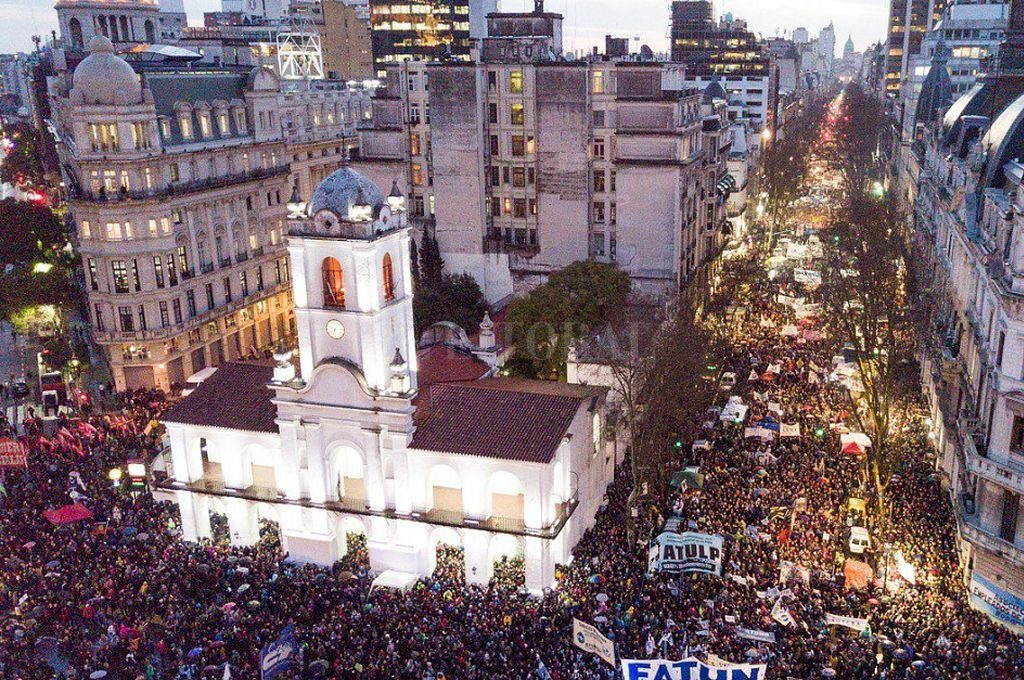Early in the morning of Thursday August 30, a group of students from three different universities blocked Corrientes Avenue in front of the iconic Obelisco monument in downtown Buenos Aires. The action had been called for in student assemblies the day before. It started as a standard fight for a better salary–an annual ritual for labor unions in Argentina– but turned into a major political conflict for the government of President Mauricio Macri.
The march was called for 5 pm, and it immediately started to rain— even hail fell in some parts of Buenos Aires—refusing to stop until 7 pm. The storm, however, would not deter the thousands of people that took to the streets and marched from the Congressional building to Plaza de Mayo. This same scene was replicated in all major cities of Argentina, cities like Mendoza or Córdoba, where tens of thousands defied the freezing rain. Called by several university professor’s unions, the demonstration was attended by not only by professors and staff but also by researchers and scientists, high school teachers, students, and workers from other sectors. The high turnout showed that this has gone beyond a mere salary struggle–it has become a fight to defend public education at all levels.
Throughout the country’s history, several administrations have tried to end free public education. However, they have faced widespread resistance each time as most Argentines consider universal higher education to be a basic right.
While the unions who had initiated the protest tried to limit the grievances strictly to salary increases, demonstrators — especially students — insisted on taking the struggle further: denouncing the government’s recent austerity measures and its new agreement with the International Monetary Fund.
In the wake of the free fall of the Argentine peso last week, the student movement has awakened, mobilizing in solidarity not only with the teachers, but also with other sectors of the working class. Last week a large contingent of students marched in support of the shipyard workers in La Plata who are fighting against privatization. This week saw the occupations of several universities throughout the country to demand an increase in the education budget, including salary raises for professors and staff.
Political and economic turmoil is galvanizing students and workers throughout the country, who are beginning to connect the current crisis to the policies of the IMF and the pillage by the local and imperialist bourgeoisie. As of July 20 of this year, there’s been a flight of $1 billion out of the country and $78 billion will be paid in service of public debt. This amounts to 23 times the budget for the Argentina’s universities. Signs from the march read “Money for education, not for the IMF” and demanded that the state end its funding of the Catholic Church and reallocate those funds for public education.
There has been strong resistance to these austerity measures inside Congress too. The PTS, as part of the Frente de Izquierda y los Trabajadores (Workers’ and Left Front) has put forward a program demanding that “the crisis be paid for by the capitalist class—those who created it.” It includes demands for the nationalization of the banking system and the strict regulation of foreign trade to stop capital flight and to reallocate resources to solve some of the most important social problems.
Argentina is seeing the convergence of a newly emboldened students’ movement with workers’ struggles that are resisting austerity, privatizations and layoffs and even sectors of the powerful women’s movement that fought for — and nearly won — the right to an abortion earlier this year. Every time we’ve witness students uniting with workers in struggle in Argentina, it’s been a game-changer. We will likely see increased mobilizations and labor unrest in the coming weeks.











